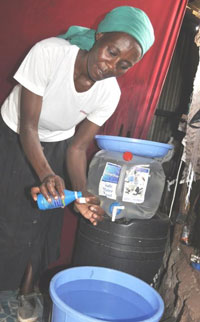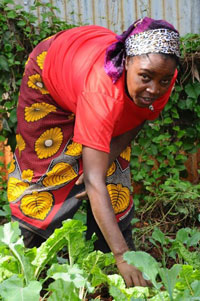Kenya - Delivering Crucial Support on the Frontlines
The WASHplus project has trained more than 300 public health officers across Kenya to integrate water, sanitation, and hygiene (WASH) messages into interventions for people living with HIV. The officials have, in turn, trained over 1,500 frontline community volunteers to help HIV-positive individuals practice good hygiene.
This strategy has worked well in places like Githunguri, Kenya. More than 60 volunteers attached to three community units in the subcounty were trained in WASH-HIV integration. Each volunteer identified 20 households with an HIV-positive client and encouraged them to adopt good WASH practices.
“We reinforce WASH messages during regular outreach to the community,” says the County Public Health Officer Catherine Muchemi. “We also encourage people living with HIV to form support groups.”
The two stories below show how people living with HIV have benefitted from WASH support from local community health workers.
Classmates’ Support Opens Doors to Hygiene Lessons
Josephine had been married for 11 years when her husband died in 2003. She suspected he had AIDS but she did not get tested. “I felt strong,” says Josephine, a mother of four, who is in her forties. 
But in 2007, Josephine fell very ill with malaria and pneumonia. Tests at a local health center showed that she was HIV-positive. Her health worsened by the day and she lost a lot of weight.
She left her husband’s home in central Kenya and returned to her mother in Kiambu, near Kenya’s capital Nairobi. Under her mother’s care, she accepted her condition and started taking life-prolonging antiretroviral medicine. Her health improved steadily and soon she could earn income doing odd jobs on surrounding farms. She even managed to rent her own one-bedroom house.
“It is an advantage to us in the group because they can come and teach us as we meet over other matters,” says Josephine. “She taught us to use [water purifiers].”
Just after she moved in, a community health worker called on Josephine during a routine visit to educate families about good hygiene. Josephine was pleasantly surprised that the volunteer was Regina, an old classmate.
The happy reunion opened doors for Regina to reach out to Josephine’s HIV support group. She attends group meetings and teaches the members living with HIV how they can protect themselves from infections by using latrines, practicing good hygiene, and drinking treated water.
Josephine knew about the importance of boiling water but did not often do so due to lack of charcoal or firewood. She now treats her drinking water with a water purification product, such as WaterGuard or Aquatabs, which she gets from the local health center or community volunteers. The group’s members have also learned about hand washing at critical times and menstrual hygiene management, among other topics.
Regina is one of 50 community volunteers trained to integrate WASH practices into interventions for people living with HIV in Kiambu County. Together they are helping more than 1,000 clients to practice good hygiene and improve their lives.
Nurturing a Positive Attitude
Much has changed in Elizabeth Njoki’s life. This 42-year-old widow living in Kiambu County, has overcome the pain of grief and self-neglect and learned to live positively with HIV.
When her husband died in 2008 after a long illness, Elizabeth learned that he had HIV. A month later she found out that she, too, was infected. 
Although she was counseled and started on antiretroviral treatment, Elizabeth did not accept her status. Despairing, she neglected herself, her two young children, and their home.
A community health worker trained by WASHplus helped turn her life around. The volunteer, Margaret, regularly visited to counsel and encourage her to live positively with her condition. “She has advised me and helped me to avoid stress,” she says. “It’s not easy living with HIV, you know. You have to avoid stress.”
The community volunteer also taught Elizabeth how to keep herself and the family home clean, and to keep her drinking water safe and clean.
“I never used to boil water; I would just come home and drink the water I found,” says Elizabeth. “Now I store water in a container and ensure that it does not stay for too long.”
Elizabeth says she has helped several other women in situations like hers. She particularly remembers the case of a pregnant woman in her twenties who found out that she and her husband had HIV. Using her own life as an example, Elizabeth helped Margaret counsel the young woman to come to terms with her condition.
“There is a big difference in my life now. I used to visit her [Margaret] regularly because I had many problems, but after accepting my status I rarely go to see her. I am also cleaner.”

